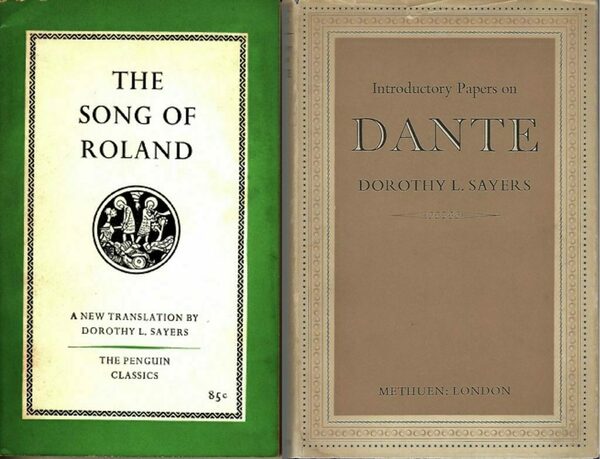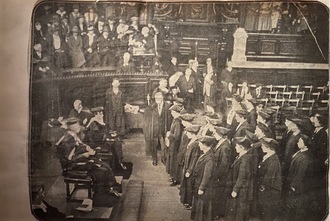

On October 14, 1920, the words, “domina, magistra” were spoken by the Vice Chancellor of Oxford University at the first ever graduation day for women. The grammatically feminine gender of these Latin words marked a major twentieth-century transition for university education. Among this first group of women was Dorothy L. Sayers. She was awarded a first-class MA degree in modern languages, a degree that she had earned in its entirety at Somerville College, Oxford University five years before but could not receive at the time merely because she was female. While her degree was in modern languages, at the time, and especially under the influence of the medievalist at Somerville College, Mildred Pope, an undergraduate degree in modern languages would have contained quite a bit of medieval studies, and this influence can be seen throughout her varied career. Whether Dorothy was writing advertisment campaigns for Guiness Beer (she did the Toucan campaign) or Lord Peter Wimsey mystery novels or radio dramas on the Life of Christ for the BBC or translating the Song of Roland and Dante’s Commedia, the Middle Ages seems to never be far from her mind.

Perhaps my favorite example from the Lord Peter mystery series occurs merely in her early characterization of Lord Peter in Whose Body? (1923). Dorothy Sayers admitted later than one of her motivations for writing Lord Peter, besides the need to earn money, was a certain kind of wish fulfillment during her own economically uncertain times. She imagines a character who has the means to live a life that she can only dream about. And what does Lord Peter do? He has his man, Bunter secure the purchase of rare books from an auction house while he follows up on a lead for his murder investigation:
“Thanks. I am going to Battersea at once. I want you to attend the sale for me. Don’t lose time—I don’t want to miss the Folio Dante* nor the de Voragine—here you are—see? ‘Golden Legend’—Wynkyn de Worde, 1493—got that?—and, I say, make a special effort for the Caxton folio of the ‘Four Sons of Aymon’—it’s the 1489 folio and unique. Look! I’ve marked the lots I want, and put my outside offer against each. Do your best for me. I shall be back to dinner.”
She even gives a footnote:
Aldine 8vo. of 1502, the Naples folio of 1477—”edizione rarissima,” according to Colomb. This copy has no history, and Mr. Parker’s private belief is that its present owner conveyed it away by stealth from somewhere or other. Lord Peter’s own account is that he “picked it up in a little place in the hills,” when making a walking-tour through Italy.
Notice that this isn’t an example of high-level scholarly influence. It is about the formation of her loves and passions soon after leaving Oxford. When she could fantasize about doing anything with money, she fantasizes about having enough money to buy expensive incunabula of Dante and de Voragine!
This is an excerpt from "The Medievalism of Dorothy L. Sayers" by Dr. Lesley-Anne Williams (MI Ph.D., 2011). Read the Full Story.
Originally published by at medieval.nd.edu on February 22, 2023.